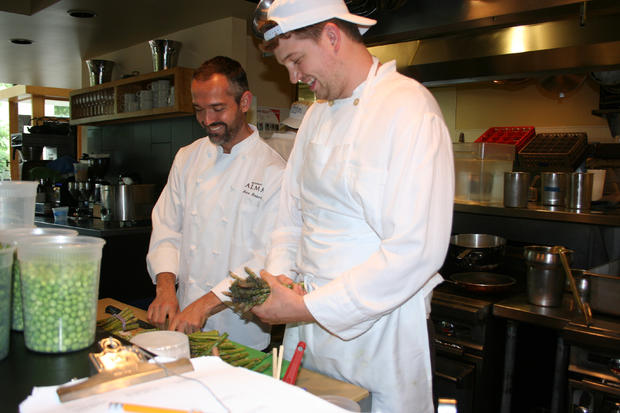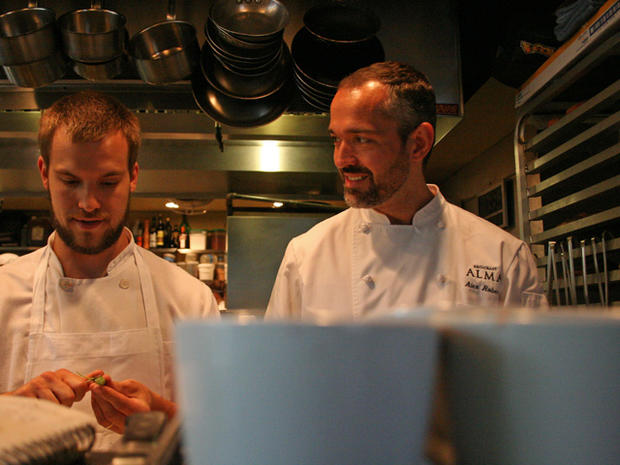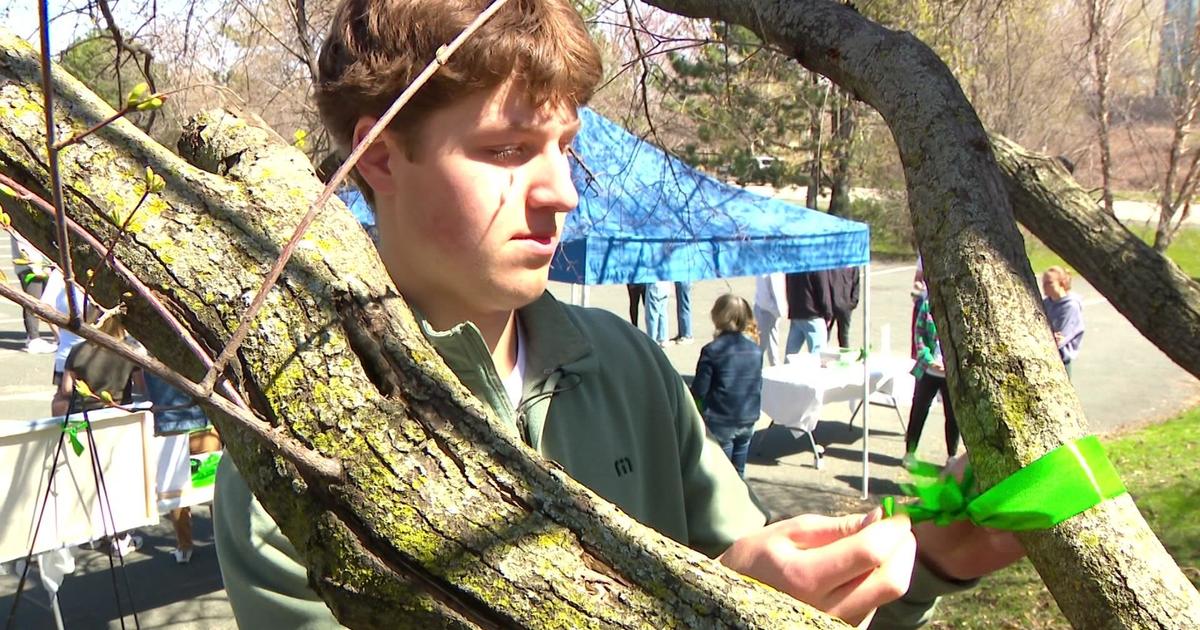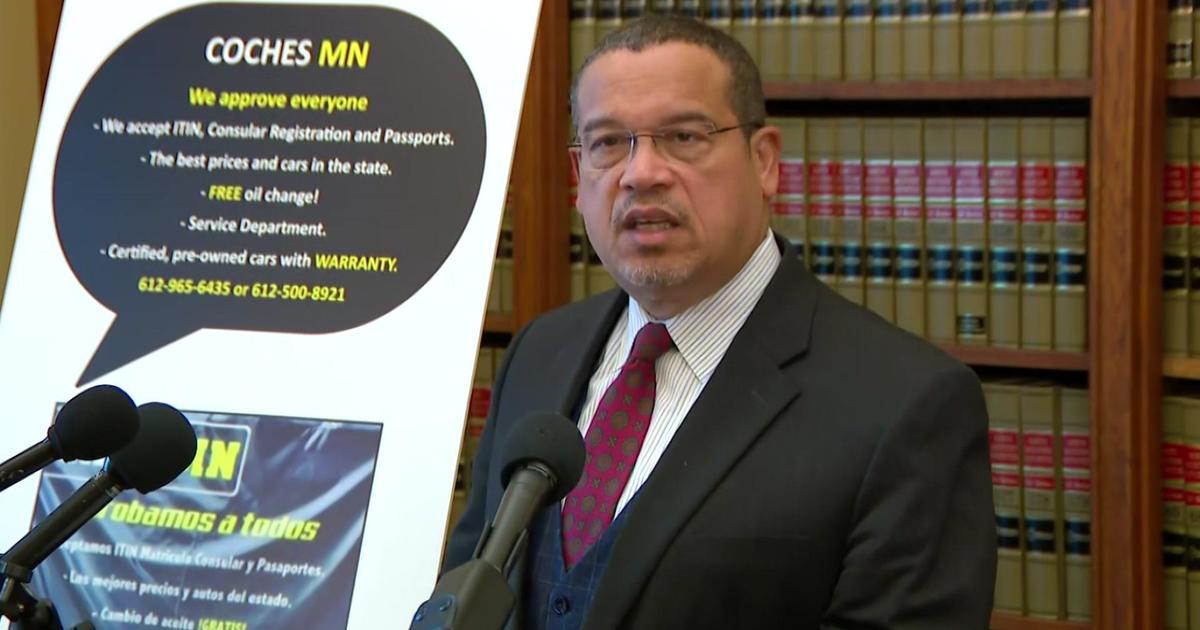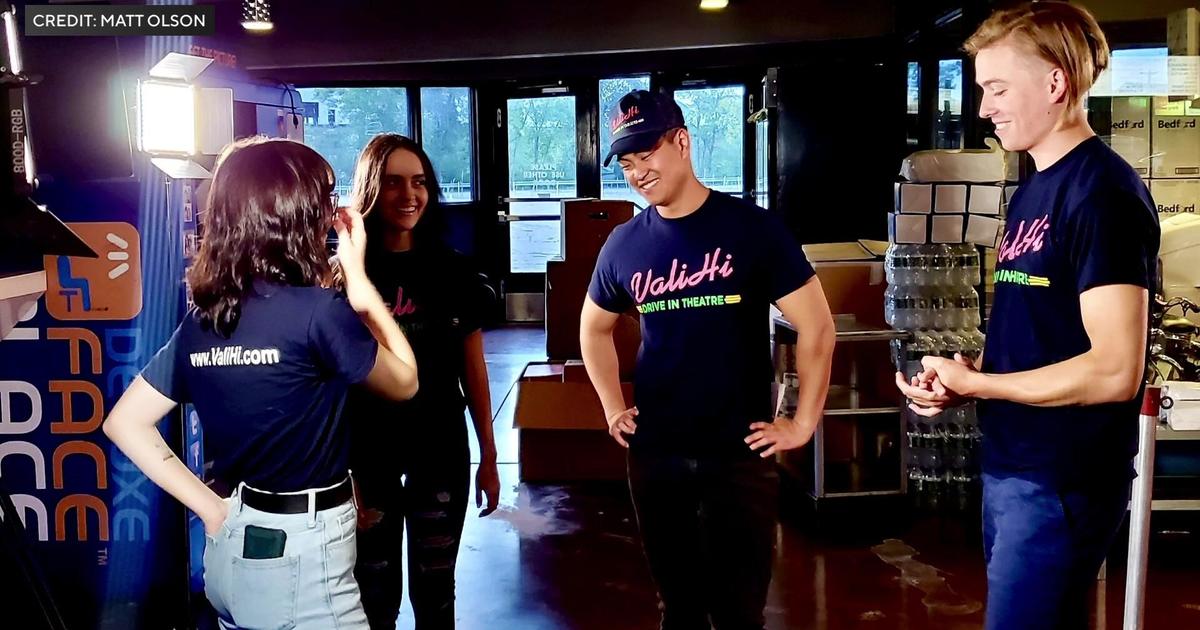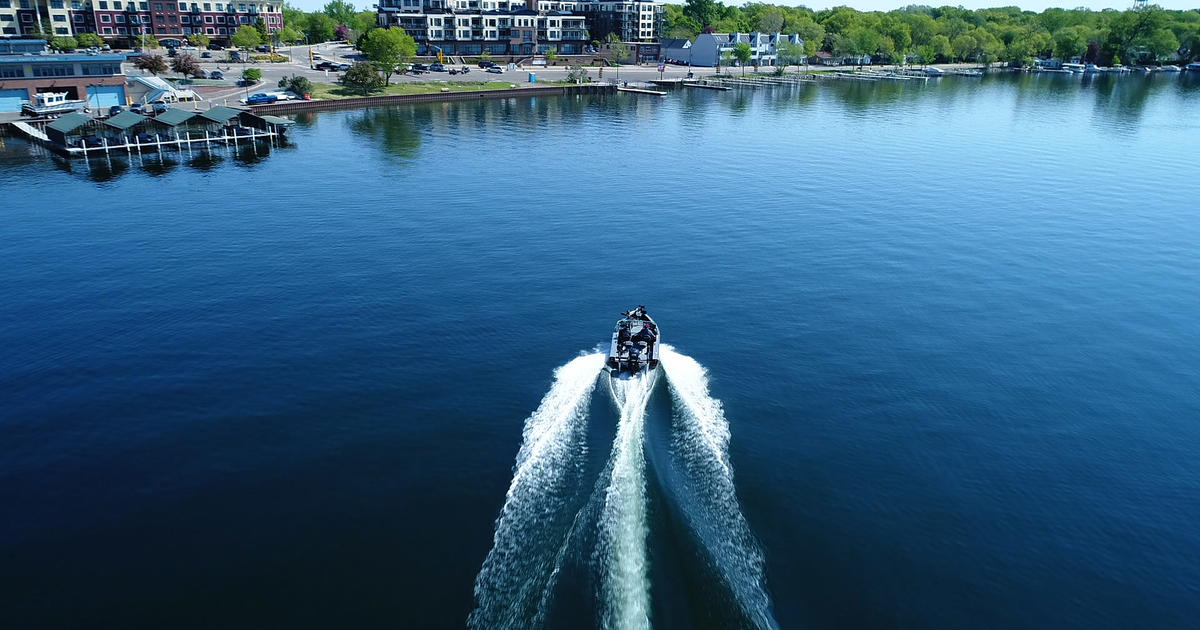Curiocity: A Chef's Profile Of Alex Roberts
The Twin Cities are blessed when it comes to talent in the kitchen. The culinary minds at the helm of our favorite restaurants receive critical acclaim and top honors from food enthusiasts and reviewers, alike. But who are the people behind the chef's coat? Our Chef's Profile aims to find out.
"There are a lot of doctors out there but there aren't a lot of chefs." Those were the words, coupled with a grandfather's urge to follow one's God-given talents, that changed the course of Alex Roberts' life.
He was well on his way to a life in the medical field when a birthday dinner gave him pause and began his exploration into a culinary career.
Now the James Beard Award-winning owner of Restaurant Alma and the Twin Cities' favorite rotisserie spot, Brasa, Roberts is living his true passion.
From enrolling into the French Culinary Institute in Manhattan to working with incredible chefs who helped mold him into the talented restaurateur he is today, Roberts said one of the most enjoyable things about this business is its endless opportunities to learn.
With that philosophical idea in mind, Roberts opened his first restaurant in Minneapolis roughly 14 years ago.
All it takes is a walk through Alma with the chef to understand how much pride and humble appreciation he has for his "first born" establishment and the incredible staff that helps him run it.
We sat down with him to chat about the chef's journey to Alma and Brasa, and the impressive influences he had along the way.
-------
How old were you when you began cooking?
I started cooking when I was really young. I was 15 and I started out washing dishes at a restaurant called Capers, in south Minneapolis. It's now the home of Terzo, the wine bar owned by the Broder family – which I was just at on Sunday for the soft open so it was really cool to kind of go back in time and be in that space. I had never been there when it was Pierre's Bistro so I hadn't been there in many years. This was in like 1987 or something like that. I'm 41 now. So I just started out washing dishes just as a job to make some money, keep me busy. I did that for maybe two months and then the chef one day, somebody didn't show up in the kitchen, so the chef was like, 'Hey, can you do this?' And I said, 'Sure, I can do that.' So I did that that day and the chef told the owner, 'He's with me now. Get a new dishwasher.' That was my first cooking job. And I loved it.
Did you come from a family of cooks?
I always had an interest in cooking. When my parents divorced, my dad wasn't a very good cook. He's since improved. But I would help out when I went to my dad's house. I always kind of liked tinkering around in the kitchen. It was always something kind of fun to do. So it became comfortable and a job I liked. So I stayed in that through high school and college.
When did you know you wanted to go into the culinary world?
I thought I wanted to be a doctor and I was volunteering downtown at the Hennepin County Medical Center during college. And I don't know, I think the idea of doing something and actually doing it started to collide for me. I decided I wasn't sure what I wanted to do anymore. I ended up having a conversation with the people I worked for, the same restaurant that Isaac Becker worked for – Lowry's – where he had his start. The owners there, three partners, took me out for my birthday and while I was doing my soul searching they said to me, 'We think you should be a chef. We think you're good at it and you should just do it. There are a lot of doctors out there but there aren't a lot of chefs.' That was true. This was about 1992, maybe – pre-Internet era, pre-YouTube, pre-cookbook publishing era. It was kind of like, what is a chef? There were a few icons but not very many. I never, ever honestly considered it as a profession. So that birthday dinner, coupled with a call to my grandfather, who said to me, 'If you have a talent in something, take it as far as you can take it because it's a blessing. If that doesn't work out then go back to what you were going to do because it'll be sitting there waiting for you' – so that's what did it. I ended up making a few trips to culinary schools, focused on New York state and New York City. I visited the French Culinary Institute in Manhattan and after a half hour in Manhattan, I was like, 'This is the place for me.' So I enrolled at the French Culinary Institute and I moved out there six months later, basically. I was 21 then. I had been in kitchens for a number of years but made the jump from just a job to thinking about it as a profession.
What was it about the food industry that made you want to turn it into your profession?
I kind of did everything – I bussed tables, I waited tables, I pretty much did every position, I did overnight baking stuff, I did some bread shaping and working at a bakery for a while. Everything I did, I liked. I enjoyed working with people and that rhythm of service, how that feels. As well as, the instant recognition of either it goes well or it doesn't go well. The quick feedback mechanism I thought was very satisfying and getting into that kind of same flow. I just really like that feeling, as well as the creative side of it – just constantly, endlessly, being in the process of learning, whether that's with food or hospitality. It never ends. Good service is about reading people accurately, assessing their needs and maybe who they are, but not judging. So for me, learning about people, especially with cultural things, is endless … I mean, how many lifetimes could you spend? The restaurant environment lends itself to some of those philosophical ideas so it was like, I think this may be enough to do for a living.
You grew up in Minneapolis, after being born in New York. What do you consider your hometown?
I was born in Buffalo, New York. My dad was teaching upstate and my mother's from here originally. My dad's actually from Los Angeles, originally, but this was the home base for my mom so we ended up moving back here. I was raised here. This is my hometown.
After working in several renowned New York restaurants, you decided to open your own in Minneapolis. What was behind that decision?
So I had been out there for just shy of six years and somewhere about halfway through working for other people, I realized, if I wanted a future in this business, I would have to work for myself at some point.
You worked for some pretty incredible people, at that.
Yeah, I really did. First of all, the French Culinary Institute was great and the chefs involved in the school were exceptional – Jacques Pépin, Alain Sailhac, who was one of the original chefs at Le Cirque which was the best restaurant of its day. He was this eccentric chef riding his bike to the farmers market, loading up the basket and going to work with all these fresh vegetables, making amazing food and six figures as a chef in the 80s. I think he was the first chef to make $100,000 in this country. I don't know – that's one of the rumors about him. He was the Dean at the school and he took a big interest in me. At that time, the school was very small – still is compared to the Culinary Institute of America. ... At that time, he was interviewing each student personally, as an entrance, halfway through the course and then at the end. He was impressed a kid from Minnesota landed a job at Union Square Cafe with no New York experience. Again, this was in the no internet era, so to find a job I looked up highly rated restaurants in a Zagat guide then literally took a Subway uptown and just wandered all the way down the east side one day and the west side the next, going to dozens of restaurants, giving them my resume. Of course, in New York if you haven't worked there, you haven't worked anywhere. No one cared what you did in Minneapolis back then. ... I went all the way down to Union Square Café where, lucky for me, they had an application that had essay questions – tell us about yourself, tell us some ideas about food, that kind of stuff. When my resume didn't amount to anything, those answers in the eyes of the chef, I was able to give him some interesting responses. I finally got a call back. One of the only responses to my resume! I actually had been hired somewhere else but it was a nightmare of a place. I needed to work there to pay my rent but it wasn't a good learning environment. I got this call from Michael Romano, the chef at Union Square Café, Danny Meyer's partner there, and got hired on as a prep cook. ... I had the good fortune to work for Danny Meyer, both at Union Square and at Gramercy Tavern, Tom Colicchio from "Top Chef," David Bouley at the original Bouley in New York and a great Italian restaurant named "Cucina" in Brooklyn. It was a great, great experience.
Most people will probably be most familiar with Tom Colicchio. What was it like working for him? Is he the same person that you see on TV?
Yeah, same guy, which is interesting. He has a very similar, very steady, measured ... sometimes his comments seem sharp to people but he's very rarely wrong and that's one of the reasons why he's so successful. He has good judgment, good process of filter, why something is good or bad, how the process is. So I had no issues with Tom when I worked (at Gramercy Park). It was a really good environment. Organizationally, it was a really healthy organization. So getting in there and seeing an example of a healthy organization was really inspiring. But yeah, I think I strayed from your original question about why I opened a restaurant here?
(Laughs) It's all good stuff though, but yeah, back to that?
Being involved in the opening of Gramercy Tavern, I think just seeing how big of a deal it was in New York, the process of opening a restaurant, how expensive it was and I just didn't have the resources to do it. Back here, even though it was still kind of a long shot putting together the resources to do it because I don't come from a wealthy family, I had some people I could approach. My former employer at Lowry's became my business partner (Jim Reininger) and was enormously supportive, as was my family. Number one, I knew I wanted to work for myself, I saw a future in it. I know Danny Meyer and Tom Colicchio are owners that create environments where you can have a career in the organization and that's what I'm trying to create here now is a place where you can stay and feel good about this work as a career and not just as a job or a transition to something else. Whether you're a server or a cook or a manager, that there's enough there that you can say," I don't need to open my own restaurant to feel satisfied or have a good quality of life." But also I would also be supportive if someone wanted to open their own restaurant – I've had a couple of staff members go on to open their own business.
Restaurant Alma has been voted one of the best restaurants in the Twin Cities numerous times. When you were putting this concept together, did you ever think it would be as successful as it is?
No, I think you're just hoping you can pay the rent and pay the loan. It's such a big endeavor. Anybody that opens a restaurant will tell you it just takes so long, all of the pieces, and it's more involved than you think it is and no one can really prepare you for actually doing it. By the time you actually get to the cooking, it's like, can I still cook? You're cooking at home on your own stove and stuff but you're kind of away from the thing that you've done the most to get you there. So I never had any idea about that. I just wanted people to enjoy my restaurant, I wanted people to frequent it and I wanted to be a success because there wasn't much of a plan B in terms of what I would do next. It was never about being the best restaurant. I believe in having a vision for excellence and reaching for that all the time, that constant process of reaching, whether it be in food or other areas of life. You really don't know what the person next to you is doing, if you're running around the track, you're the one that's running, it's your time to beat. With cooking, it doesn't really matter what's happening down the street – that's someone else's cooking and this is your cooking. So I just focus on that. But it's a real honor to be on that short list of what people consider to be the best restaurants. There are many more now than there used to be but there's plenty of room, especially with a community that seems so supportive.
You also won the James Beard Award in 2010 for your work, after four consecutive nominations. What was that experience like?
I'd say the first year being nominated was every bit as exciting as actually winning. In between, you just feel kind of like, you just want to get nominated again. There's a nomination process that whittles down an initial big group, the semifinals, then finalists from there and you really want to be in that final group of five. Once you're nominated once, you want the chance to win it again. It's kind of relief by the time you win. I think when you go there, you realize there's so many versions of excellence in food, beverage and hospitality. The thing with the Beard awards is it's full of our heroes in the food business, the Mario Batali's and Tom Colicchio's, and the people that have made a real mark on American cooking in some significant way – a way that I have not done in my career. I have provided some example and guidance to people in this restaurant scene and provided leadership to promote quality in many areas but I'm not necessarily as much of an originator, you know, as some of those people are. So to be alongside those guys at those awards is really amazing. All the nominees have a different version of excellence they're reaching for so really, everyone deserves to win. So it's pretty amazing that way. It's just an honor to be nominated and the morale boost to our staff was extraordinary. Yes, the award is in my name but it's really a restaurant award. It's really a huge thing for everybody and of course, the attention that we get from the media is the best free advertising you could ever imagine. Especially for a restaurant that doesn't advertise.
Check back next week for Part 2 of our chef chat with Alex Roberts. For more information on his restaurants, click on the following links: Brasa | Restaurant Alma.
